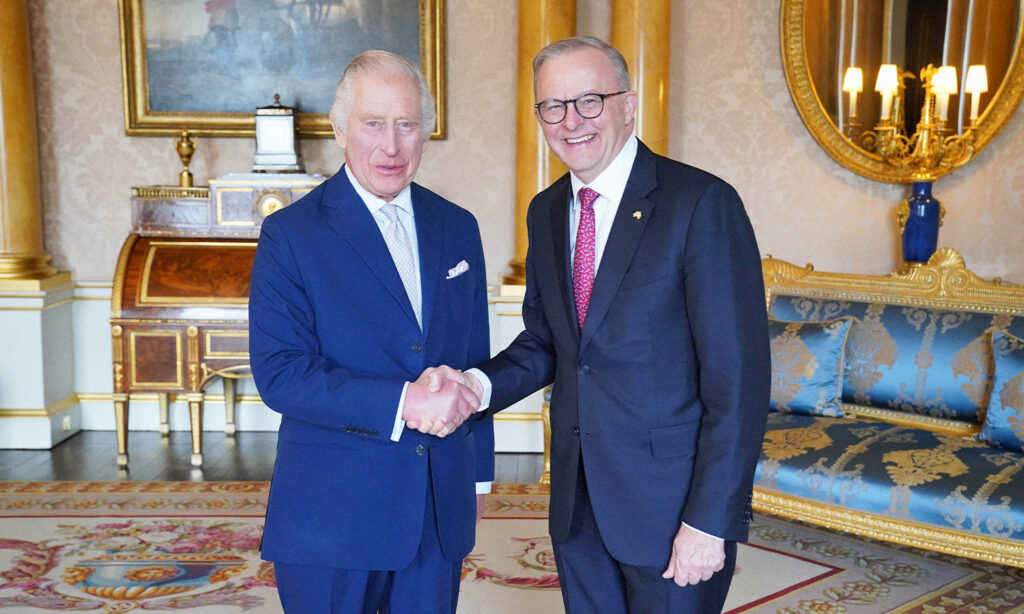Australia won’t become a republic anytime soon if Prime Minister Anthony Albanese has his way. The “life-long” Republican who previously campaigned on a referendum to ditch the Crown is currently in the UK to bend the knee to King Charles at his Coronation.
Of course, as a Commonwealth country that still has the face of his mother on our money, it is not only expected of Albanese to do so but it would be cringe of him not to. Real IAmTheMainCharacter energy.
Still, the bonds of protocol have not stopped Albanese from going further than perhaps necessary, much to the chagrin of ardent Republicans, by saying that a vote on a republic was not “imminent.”
“I think you can be a lifelong Republican, which I am, and still respect our institutions. And certainly, I have a great deal of respect for King Charles,” Albanese said in an interview with Piers Morgan.
The comments come as Australians are being asked to swear an oath of loyalty to King Charles during the Coronation, something the Albanese himself has refused to comment on.
Prime Minister Anthony Albanese has dodged a question about whether Australians should swear allegiance to King Charles, just days after they were urged to "cry out" their support for the new monarch.
Read more: https://t.co/bvHtxNITOZ pic.twitter.com/VBWRpIoDOP
— SBS News (@SBSNews) May 1, 2023
The Australian Republic Movement has been up in arms, as they often are around times of excessive Royal publicity, about the whole thing.
Head of the Australian Republic Movement, Craig Foster, has tweeted that the PM shouldn’t bow down to a foreign monarch, only to the people he actually serves.
“The Australian Prime Minister and MPs should pledge loyalty to the Australian people, not a foreign monarch who is completely detached from Australian life, democratic principles and accountability, and Australian values. Our only pledge is to each other,” Foster wrote.
While the Coronation is expected to receive a somewhat muted audience in the land down under, it has incited conversations about whether or not Australia still needs to be a part of this arcane system.
Support for breaking away from the Monarchy has fluctuated over the years but it appears somewhat inevitable that Australia will eventually bite the bullet.
At the start of 2022, polling by Resolve Political Monitor found that a narrow majority of 54% of the population supported a republic. However, this remains fairly unchanged over the past two decades.
Following the death of Queen Elizabeth II, a 5% increase in Republican support was shown in a Roy Morgan poll, with 60% of those surveyed supporting the idea.
In January of this year, following the fallout of the split between Prince Harry and Meghan Markle and the Royal family, documented in Harry’s book, Spare, support for a republic grew even stronger.
Republicanism is not exactly a controversial opinion. It’s official party policy of the Greens and the Labour Party with some members of the Coalition also in favour. When and how that happens is a whole separate question.
Divisions over what kind of government structure Australia would have post-monarchy is what is thought to have sunk the previous republic referendum and, even though a majority support binning the King in some polls, fewer people support the Australian Republic Movement’s idea of electing a head of state.
Albanese, in his interview with Morgan, also added that he believes Australia will become a republic “at some stage in the future.” However, he added that he doesn’t want to spend his Premiership “presiding over just constitutional debates,” in reference to the upcoming Voice to Parliament referendum.
Those comments appear to clash with previous ones in which Albanese appeared to slate a second term, if he were to get one, as the time to re-run the Republican vote. Perhaps he no longer has the stomach for it or, like many, realises that it will be one long, bloody conversation that ends up dividing the country further. And Lord knows we need less of that when there are so many more important things to focus on.
“Australians made a choice in 1999, and one of the things that you’ve got to do is to accept democratic outcome. We made that choice, and I will certainly engage in that spirit,” Albanese told Morgan when asked whether he would pledge allegiance to the King.
“I’m not a monarchist. I’m a Republican. But that doesn’t mean that I don’t respect the institution which is there, which plays a role in our system of government,” he continued.
So, while Albanese was the first to appoint a Minister for the Republic when he took office in 2022, with the republic referendum pencilled in for the term after the Voice to Parliament, it seems as though that schedule may have been pushed back.
With the next election not until 2025, with a vote possibly taking place in 2026, the revised timetable looks like we may have to wait until the end of the decade to break free from the Crown. That’s if the entire institution survives that long.
Related: King Charles Might Love Australia, But Should We Love Him Back?
Related: King Charles Is a Slept-On Climate Activist, But Could He Actually Make a Difference?
Read more stories from The Latch and subscribe to our email newsletter.







